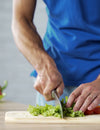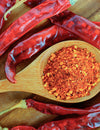
Cooking meals at home is a great way to eat healthier and save money. For many people, it is also the perfect way to unwind after a busy day.
As a budding home chef, there are several essential skills to learn and pitfalls to avoid in order to improve your cooking. Here are some common cooking mistakes.
Cross-Contaminating
Cross-contamination in the kitchen is a common cause of food poisoning. Food poisoning causes violent illness and can even lead to death. Learning how to avoid cross-contaminating your food is probably the most vital skill you can gain as a novice cook.
Most importantly, never let your raw meats, especially poultry, come into contact with other foods. Use an assigned cutting board and knife for raw meat. Also, carefully disinfect everything that touches your raw meat, including the counter, sink, and your hands.
Using the Wrong Knife
Using the proper kitchen knife makes a huge difference when it comes to the ease and safety of cooking. Using the wrong knife makes cutting much more difficult, which makes cutting yourself far more likely. Every home cook should have three good knives in their kitchen: a serrated knife, a paring knife, and a chef's knife.
Serrated knives are ideal for slicing anything that is soft in the middle but hard on the outside, such as tomatoes and bread. Because paring knives are small and sharp, they are great for anything requiring fine motor skills, such as coring, peeling, and trimming veggies. A chef’s knife is one of the most versatile knives you can have in your kitchen. It can be used for just about anything, although it is mostly used for chopping.
Using Heat Incorrectly
You might think that your ingredients are what make a great chef. While ingredients are key, you can never become a truly great chef unless you learn to properly use heat. The same ingredients that go into a masterful dish at a restaurant can be cooked at the wrong temperature at home and taste awful. Gaining control over your heat sources is paramount. Knowing when to grill, broil, bake, roast, saute, boil, simmer, and fry your foods and what temperature to do it at will make all the difference in your cooking.
You can improve your cooking and become a great home chef by learning a few basic skills. First and foremost, safety in the kitchen is vital for your health and well-being. Next, be sure to get the right tools, including high-quality knives, pots, and pans. Finally, understand both the ingredients you use and how to utilize the right heat source to pull the most flavor out of them.
Did you like reading this article? Here’s more to read. How to Make Your Meals More Filling






